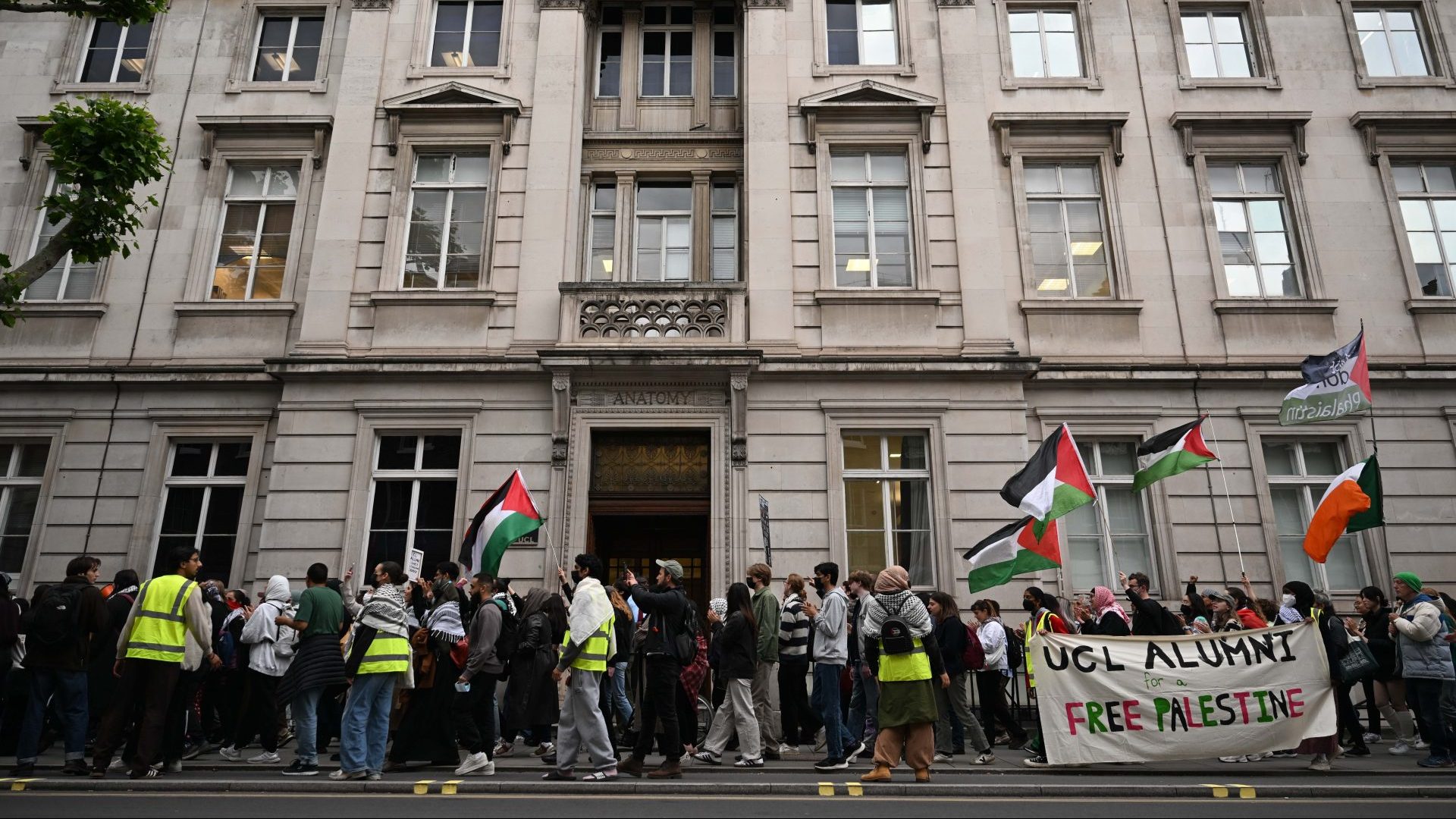I had expected the flags and the tents and the security cordon; I could wrap my head around the encampment-themed rap, thumping from a speaker. What really surprised me when I visited the pro-Palestinian student encampment in UCL’s Main Quad was the free chai tea.
My university had broken up for the holidays before the UK encampment movement got going: I wanted to see what was going on for myself, so I’d visited Oxford and UCL, and video-called protesters in Dublin and Mexico City.
After “sneaking” past UCL’s cordon (on paper, only UCL students could enter, but a wave of my Scottish student ID and a vague excuse got me past the guard) I got an interview with the encampment’s press officer, who asked I call her Ramallah19. Ramallah is the name of a city in the West Bank: “We’ve all named ourselves after Palestinian towns,” Ramallah19 told me, “just to keep the legacy alive. ‘19’ because I’m nineteen. Also, I like it. It suits me.”
I asked Ramallah19 why she was protesting – among her reasons, she talked about the British company BAE Systems. “It’s a company that manufactures components for the F-16 fighter jets that bomb students in Gaza, and they sit here in London on the board of ethics in UCL.”
The encampments’ demands to their respective universities are that they should cut ties with Israeli universities, divest from companies linked to Israel, join the International Criminal Court in condemning Israeli war crimes, fund scholarships for Palestinians, and pledge money to rebuild education in Gaza. (“There are no universities left in Gaza,” was repeated several times to me). “It’s only fair,” Ramallah19 said. “If you help fund the bombs that drop on it, you help fund the scaffolding that will lift it back up again.”
Two days before UCL, I had visited Oxford. There, protesters had set up tents on the lawn outside the Pitt Rivers Museum, to call attention to the museum’s colonial legacy. Dee, the Oxford encampment’s press officer, said nearly two thousand people had signed an open letter to support the protests. But neither UCL nor Oxford encampments had made tangible progress with their respective universities. “They’re trying to act like it doesn’t matter,” Ramallah19 said. University-wide emails had circulated, but nothing the protesters were happy with. “They said that they wanted constructive dialogue,” Dee said. “But through all of that, they didn’t even name the word ‘genocide’.”
Protesters I talked to at Irish and Mexican universities reported more success. Eduardo, a physics student at the National Autonomous University of Mexico (UNAM), said UNAM had agreed to “evaluate” its links with Israeli firms – but he still didn’t trust them. “We have already internalised the fact that they will not do that without putting [up] a fight,” he said. “I am not confident that we can appeal to their morality.”
The Trinity College Dublin encampment was perhaps the most successful. Protesters had blocked access to the Book of Kells, a Celtic manuscript owned by the university that draws over a million visitors each year. László Molnárfi, Trinity’s student’s union president, estimated the blockade had cost the university €10,000 an hour. “[Trinity] College was brought to the negotiating table – they were absolutely rattled,” László said. Trinity agreed to divest from Israeli firms blacklisted by the UN for activities in Occupied Palestinian Territories only five days after the encampment started.
Trinity protesters’ tactics might give one reason why they have seen more success than British counterparts (the Oxford protesters never actually blocked visitors to the Pitt Rivers Museum) but the Irish encampment’s success, László suggested, was more down to specific national context. Ireland has a “strong history” of supporting Palestine. “That’s not necessarily the case in other places,” László said. To comply with its protesters’ demands, Trinity only needed to divest from three Israeli companies; Dee, meanwhile, said the Oxford encampment was targeting investments worth at least $8bn.
Seventeen students were arrested after Oxford students occupied university offices: but when the Dublin encampment blocked the Book of Kells, “they knew they couldn’t move us by force,” László said. “If you call in the police to Trinity College Dublin protesters, that’s the end of your career.”
László, like all the interviewees, completely rejected the idea that the encampments were antisemetic; Jewish pro-Palestine protesters “in their very existence” refute that idea, Ramallah19 said.
“We are not interested in having antisemitic people here in the pro-Palestine movement,” Eduardo emphasised. Both the UCL and Oxford encampments had organised Shabbat dinners for Jewish members – one of the most prominent slogans in the Oxford encampment I visited read: “Jews For A Free Palestine.”
One of the more controversial slogans used in some encampments is the chant: “From The River To The Sea”. Its meaning has been “distorted,” Ramallah19 said. “Historically, Muslims, Christians, Jews, atheists, lived in that region peacefully […] When we say things like, ‘From The River To The Sea’ it absolutely is not a call for the eradication of anything. It’s a call for the end of settler colonialism.”
That message was repeated, in some form, by all the protesters I interviewed. “What we want – it’s always been the case,” László said, “is a country where there is no more human rights violations, where people of all faiths and backgrounds can be together as equals.”
Dee said that Jewish pro-Palestinian protesters had been harassed in an incident at the Oxford encampment a few days earlier. “Six men pulled out of a van,” Dee said. “[They] came right up here, started tearing down our art, shouting a lot of antisemitic slurs to our Jewish community members, and commenting on their ability to be Jewish and in this space.”
I asked the protesters if they saw their encampments surviving the summer holidays. “There is a high chance that a lot of the people that are here will move out,” Eduardo said. “Physically, our position might be compromised.”
The UNAM protesters, though, were planning to merge with another encampment run by a teachers’ union – so even if attendance flagged over the summer there’d still be something there when students came back. “Obviously that fear is there,” Ramallah19 said, when I asked her the same question. “[But] the invasion of Rafah will only intensify over the summer,” she added.
Interviewees pointed to the hundreds, sometimes thousands of people who had attended marches and signed open letters. “1,200 students have signed on to this campaign, that’s only the last time I checked, it only launched two days ago,” Dee told me. The encampments have seen support from staff as well as students: on 27 May, Jewish academics at Oxford wrote an open letter in support of the Oxford encampment.
The student movement, László said, reflected anger that wasn’t just limited to Gen Z. “Look, my parents are not that political,” László told me, “but […] because we’ve heard about it so much, they’ve even learned more about it, and they understand the situation. So I think it’s changing, to be honest. I think it was something that, when you watch those images and videos coming from Palestine, what Israel is doing, that leaves a mark. It calls your humanity to act, and understand what’s going on.”
British universities seem to see the encampments’ demands as primarily financial or political matters, while protesters see the situation as ethical. This is not, however, an unresolvable tension. Cambridge protesters (who greeted Suella Braverman with a wall of silence when she visited with a GB news crew) dismantled their encampment when their university agreed to negotiate.
Other universities which have not yet engaged with their encampments, perhaps in the hope that protests will fizzle out, may need to rethink their strategies. Many of their protesters I met were not fad-followers. They seemed anguished, deeply committed, and ready for the long haul.
“I worked really hard to get into this Russell Group university,” Ramallah19 told me, when I asked why she was protesting. “I want to fall in love with my institution again. We are all here fighting for, I guess, that right to love our institution, that right to be proud of where we’re one day going to graduate from.”










